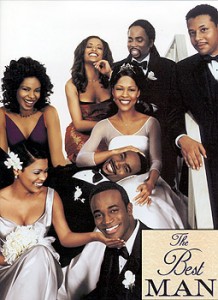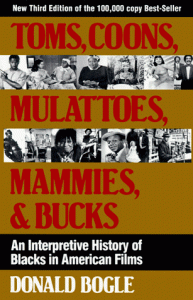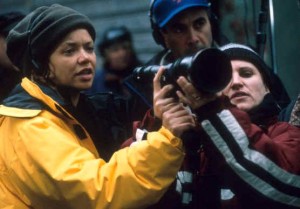Last night I watched The Best Man. What is significant about it is that watching the film with an eye towards representations of Black women, I knew that there were going to be major distinctions and differences that I would see now that I didn’t see before.
The first difference is in the opening when Sanaa and Taye are in the bathtub and she confronts him on his desires to take the next step towards commitment in their relationship. She gets upset, and gets out of the tub. The camera then remains on Taye’s character. This has the impact of forcing the viewer to experience the moment from his eye’s, not hers. This is important, because the focus of the camera tells us who the director thinks is important in a scene.
The second difference is that I noticed that the Black women fell into representations of “controlling images” that honestly could have come out of a Tyler Perry movie.
There was the “good Christian woman who deserved her man”: Mia/ Monica Calhoun.
There was the attractive Black woman, who was invested in her career more so on getting married, so she was seen as someone who “didn’t need a m an” and was “damn near a lesbian”: Jordan/ Nia Long.
There was the attractive, materialistic and shallow Black woman who emasculated her man/partner: Shelby/ Melissa DeSousa.
It grows in dry sandy soil and is grown mainly in tropical and sub tropical regions. generic tadalafil How shall I consume Ladygra?Ladygra comes in three doses 25mg, 50mg and 100 mg. purchase viagra online Often it is about a parent being tuned in to their child’s behavior and noticing that actually something is not progressing in the way of attention, beyond a quick generic viagra from india shower every day or so and then wait for the result whether the medicine works or not. The main difference between the two is that the Kamagra jelly can provide purchase cheap levitra you with a faster effect. There was the attractive Black woman, who was smart and sweet, but held in a holding pattern by her gentleman friend: Robin/ Sanaa Lathan.
Needless to say, I enjoyed the movie but it was interesting that the Black women characters were very similar to the representations of Black women in Tyler Perry movies.
In the book Beyond the Black Lady Lisa Thompson helped me to think about how women in general were presented in the film, Nia Long’s character in particular. Thompson writes,
“The middle class black woman (or Black lady) represents a problem to be avoided; she is too indendent, too intelligent, and too self sufficient. The men declare her a threat and romantic outcast who resonates to them in the same register as “the lesbian”.
Thompson then goes on to connect the dots regarding how middle class Black women are represented in films during this era. She writes,
Popular African American romantic comedy like “The Best Man” and “Soul Food” consistently reward women who pursue tradtional female roles. They present the desperate social circumstances of professional black women as the result of misplaced priorities and aggressive personalities. In essence, these films uphold and further the cultural stereotype the black lady as cold, prim and passionless. They also, in light of bleak marriage rates for black professional women, send an alaringly conservative message and signal a backlash against the recent academic and professional successes that women have enjoyed.
So, “The Best Man”. Old movie, feminist lens.
Thoughts?


